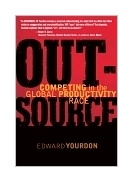|
||
• wydawnictwa polskie
• Zamów informacje o nowościach z wybranego tematu • kontakt
• Cookies na stronie |
OUTSOURCE COMPETING IN THE GLOBAL PRODUCTIVITY RACEYOURDON E.wydawnictwo: PH.PTR , rok wydania 2004, wydanie Icena netto: Objective strategies and guidelines for coping at the individual, corporate, and national level with the Outsourcing phenomenon Yourdon looks at all angles of a key trend in the 21st century - offshore outsourcing of "knowledge work." Yourdon shares his vast experience with vendors and purchasers of offshore products and services, discussing the implications of this growing trend for individuals, companies, and for government/society at large. Anticipated future trends are presented as well! Brain Drain does not focus on just the IT phenomenon, though it continues to be one of the more prominent examples because of recent media coverage of outsourcing. The focus of this book is more on strategies and guidelines for coping--at the individual, corporate, and national level - with a phenomenon that's already here, and alresy "mainstream" in nature. The real focus of this book is on the individual. After all, it has been individuals who have emailed Ed continually, ever since the publication of Decline and Fall of the American Programmer. It's individual knowledge workers, far more often than corporate executives, who run the risk of losing their jobs as a result of this global shift of products and services. And it's individuals, as several correspondents have reminded me in recent months, who have to advise their children what careers and professions they should follow - and the outcome of those choices will ultimately have a far more profound effect than a politician's modification of a visa quota. EDWARD YOURDON has been a futurist, pundit, and advisor to CEOs around the world for nearly 40 years. He has been named as one of the ten most influential people in the software industry and has been inducted into the Computer Hall of Fame along with Charles Babbage, Grace Hopper, Bill Gates, Seymour Cray, and James Martin. A New York Times best-selling author, his two dozen books include such classics as Nations At Risk, Decline and Fall of the American Programmer, Death March, and Byte Wars. Several of his books have been translated into Japanese, Russian, Spanish, Portuguese, Dutch, French, German, and Polish. He has testified before the U.S. Senate on the Y2K problem, has served on advisory councils of the U.S. Defense Department, and has been a board member of numerous high-technology companies in the United States and India. Yourdon received a B.S. in Applied Mathematics from MIT and has carried out graduate work at MIT and the Polytechnic Institute of New York. He has been appointed an Honorary Professor of Information Technology at Universidad CAECE in Buenos Aires, Argentina and has lectured at MIT, Harvard, UCLA, Berkeley, and other universities around the world. He has been quoted and interviewed in numerous newspapers and magazines, including the New York Times, Wall Street Journal, Los Angeles Times, Christian Science Monitor, Newsweek, Boston Globe, the Times of India, and several computer trade publications. He has also been interviewed on numerous TV news shows and radio programs, including CNBC, National Public Radio, ABC Evening News, and Fox News. Contents Acknowledgements. 1. Introduction. 2. Key Factors Driving Outsourcing. Introduciton. 3. Today's Situation in It. Introduction. 4. Additional Forms of Outsourcing. Data Entry: The Bottom End
of the Food Chain. 5. Likely Trends for the Next Decade. Introduction. 6. Implications for the Individual. Introduction. 7. Implications for Companies Supplying Knowledge-Based Services. Introduction. 8. Implications for Companies Buying Knowledge-Based Products/Services. Introduction. 9. Implications for Government/Society. Introduction. 10. Conclusion. Introduction. 251 pages Księgarnia nie działa. Nie odpowiadamy na pytania i nie realizujemy zamówien. Do odwolania !. |


